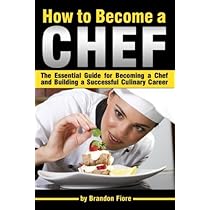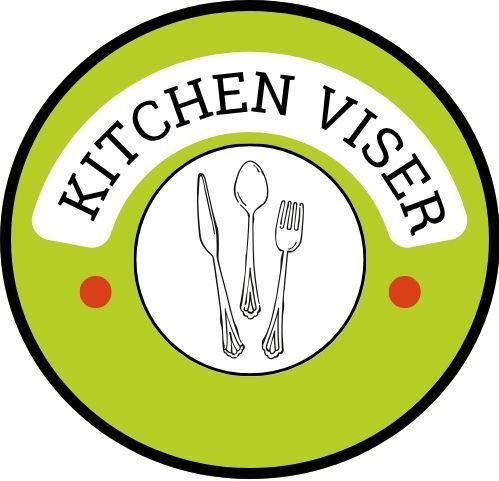Are you passionate about food and dream of creating mouthwatering dishes? Do you find joy in experimenting with flavors and textures?
If so, becoming a chef might be your calling. Imagine the thrill of mastering culinary skills, the satisfaction of serving your signature dish, and the possibility of turning your passion into a successful career. In this essential guide, you’ll discover the steps you need to take to transform your culinary dreams into reality.
From honing your skills to understanding the nuances of the kitchen, we’ve got you covered. Dive in, and let your culinary adventure begin. This guide is your first step towards a rewarding and flavorful future.

Credit: www.amazon.com
Choosing Your Culinary Path
Embarking on a culinary journey can be thrilling. The path to becoming a chef offers many options. Choosing the right culinary path is essential. Your interests and goals play a key role in this decision. This guide helps you explore these options.
Different Types Of Chefs
Many roles exist within the kitchen. Each has its own responsibilities. The Executive Chef leads the kitchen team. They plan menus and manage the staff. Sous Chefs assist the Executive Chef. They oversee daily operations in the kitchen. Line Chefs focus on specific tasks. These include grilling, frying, or baking. Each position requires unique skills. Understanding these roles helps in career planning.
Specializations In Cuisine
Chefs often specialize in a particular cuisine. This decision shapes their cooking style. French cuisine focuses on sauces and presentation. Italian cuisine celebrates pasta and fresh ingredients. Asian cuisine offers a variety of flavors and techniques. Each cuisine provides unique challenges and rewards. Exploring different cuisines broadens culinary horizons.

Credit: www.amazon.com
Education And Training
Becoming a chef requires dedication and a passion for food. Education and training form the foundation of a successful culinary career. Aspiring chefs have multiple paths to acquire the necessary skills. Some opt for formal culinary schools, while others choose apprenticeships. Both paths offer unique benefits and challenges.
Culinary Schools Vs. Apprenticeships
Culinary schools offer structured programs with a focus on theory and techniques. Students learn under experienced instructors in professional kitchens. These schools provide access to specialized equipment and resources. They also offer networking opportunities with industry professionals.
Apprenticeships focus on hands-on experience in real kitchens. They provide practical learning directly from seasoned chefs. Apprentices work alongside chefs, gaining insight into the daily operations. This path often requires less financial investment than formal schooling.
Essential Courses And Skills
Essential courses in culinary education include knife skills, food safety, and nutrition. Students learn the art of sauce making and pastry preparation. Cooking techniques like grilling, baking, and steaming are taught. Knowledge of international cuisines expands culinary versatility.
Skills in time management and organization are crucial. Understanding flavor profiles and ingredient pairing is important. Effective communication skills benefit both teamwork and customer interaction. Creativity and adaptability help chefs excel in diverse culinary environments.
Gaining Experience
Building hands-on skills is crucial for aspiring chefs. Practice in local restaurants or join culinary workshops. Gaining experience helps refine techniques and creativity in the kitchen.
Gaining experience is a crucial step in your journey to becoming a chef. It’s not just about learning recipes or techniques; it’s about immersing yourself in the real-world kitchen environment. This is where you hone your skills, adapt to the fast-paced setting, and learn the art of collaboration. Are you ready to dive into the culinary world and build your path to success?Internships And Entry-level Positions
Internships offer you a golden opportunity to learn from seasoned chefs. They allow you to observe and understand kitchen dynamics firsthand. Start by looking for restaurants or culinary establishments that align with your interests. Perhaps you want to specialize in Italian cuisine or pastry arts. Reach out and inquire about internship opportunities—they’re often looking for passionate learners. Entry-level positions are equally important. They might not sound glamorous, but they provide a solid foundation. As a line cook or prep cook, you’ll get your hands dirty and learn the ropes. These roles teach you time management, precision, and teamwork—skills every chef needs.Building Your Culinary Resume
Your resume is a snapshot of your journey and experiences. Highlight your internships and entry-level roles prominently. Include specific tasks you’ve mastered and mention any unique experiences. Did you assist in preparing a large banquet or work under a renowned chef? These details make you stand out. Consider adding any awards, workshops, or certifications that showcase your dedication. A well-rounded resume is your ticket to more advanced roles. What unique skills can you bring to the table? Think about this as you craft your resume. Employers are looking for passion, adaptability, and creativity. Engage with culinary communities online or in-person to broaden your network. This can lead to unexpected opportunities and invaluable mentorship. Are you ready to take the next step in your culinary adventure?Mastering Culinary Techniques
Discover essential culinary skills needed to become a chef. Learn knife techniques, flavor combinations, and cooking methods. Gain confidence in the kitchen and prepare delicious meals with ease.
Mastering culinary techniques is key to becoming a skilled chef. These skills form the backbone of every dish. With practice, you can create delicious and visually appealing meals. This journey requires patience and dedication. Yet, it offers immense satisfaction.Knife Skills And Cooking Methods
Proper knife skills enhance your efficiency in the kitchen. Start by learning how to hold a knife correctly. Use a firm grip for control and precision. Practice basic cuts like chopping, dicing, and slicing. Each cut should be uniform for even cooking. Cooking methods also play a crucial role. Familiarize yourself with techniques like sautéing and grilling. Understand the difference between boiling and simmering. Each method affects flavor and texture. Experiment to find what works best for each ingredient.Experimenting With Recipes
Experimentation is vital for culinary growth. Begin with simple recipes. Try adding unique ingredients to traditional dishes. Adjust seasonings to suit your taste. This helps develop a personal cooking style. Keep a notebook to jot down successful experiments. This creates a personalized recipe collection. Share your creations with friends and family. Feedback helps improve your skills. Cooking is an art. Each dish tells a story. Embrace creativity and enjoy the process.Developing Your Culinary Style
Explore your unique cooking flair by learning essential chef skills. This guide helps in crafting your culinary identity. Step into the kitchen and start your journey to becoming a chef.
Developing your culinary style is a journey that transforms you from a recipe follower to a creative chef. It’s about discovering what makes your dishes stand out. As you progress in your culinary career, you’ll find that this personal style becomes your signature in the kitchen. It’s your way to express who you are as a chef and to connect with others through food.Finding Your Unique Flavors
Every chef has a unique flavor profile, a distinct combination of tastes that defines their cooking. Start by experimenting with ingredients you love. You might find that certain spices or herbs resonate with you. Think about the flavors that excite your taste buds. Are they spicy, sweet, or savory? Make a list of your favorite ingredients and try pairing them in new ways. Your personal experiences can shape your culinary style. Perhaps a childhood memory of your grandmother’s cooking inspires you. Use these memories to guide your experiments in the kitchen.Incorporating Cultural Influences
Cultural influences can enrich your culinary style. Explore the cuisines of different cultures to see how they use spices and cooking techniques. This can broaden your perspective and add depth to your dishes. Traveling, even if just through cookbooks or online resources, can expose you to new flavor combinations. If you love Italian cuisine, consider how its fresh ingredients and bold flavors might blend with another culture’s techniques. As you integrate these cultural elements, make sure they reflect your personal tastes and experiences. Ask yourself: How can I make this dish truly mine? By developing your culinary style, you invite your diners into your world. What story will your flavors tell?Understanding Kitchen Dynamics
Understanding kitchen dynamics is crucial for anyone aspiring to become a chef. The kitchen is a bustling environment, filled with diverse roles and responsibilities. Navigating this space requires strong interpersonal skills and effective communication. A chef must understand the flow of the kitchen, the hierarchy, and the importance of each team member’s role. By mastering these dynamics, you can create a harmonious and efficient kitchen.
Teamwork And Leadership In The Kitchen
Teamwork is essential in any kitchen. Each member contributes to the overall success. Chefs lead by example, guiding their team through busy shifts. They foster a collaborative environment, encouraging open communication and mutual respect. This leadership builds trust and boosts morale. A chef’s ability to inspire and motivate is key to a smooth-running kitchen.
Managing Stress And Time
The kitchen is a fast-paced environment. Stress levels can be high during peak hours. Effective time management is crucial. Chefs prioritize tasks and delegate responsibilities. They maintain composure under pressure, ensuring each dish meets the highest standards. Managing stress involves staying organized and focused. These skills are vital for a successful culinary career.
Navigating The Culinary Industry
Breaking into the culinary industry can seem daunting. The field is vast, with many paths to explore. Understanding its dynamics is crucial for aspiring chefs. Building connections and seeking growth opportunities are key steps.
Networking And Professional Associations
Networking is vital for aspiring chefs. Connections can lead to job opportunities. Joining professional associations is beneficial. They offer resources and events that can help you grow. Attend local culinary events. Meet industry veterans and learn from them.
Online platforms also offer networking possibilities. Engage in culinary forums and discussions. Share your experiences and tips. This builds your online presence and reputation.
Job Opportunities And Career Growth
The culinary field offers diverse job opportunities. Restaurants, hotels, and catering companies often seek talent. Start in entry-level positions. Gain experience and work your way up.
Consider internships or apprenticeships. They provide hands-on learning and skill development. A mentor can guide your career path. Their advice is invaluable.
Career growth in the culinary world requires dedication. Always learn and adapt. Attend workshops and training sessions. Stay updated with food trends and techniques.
Starting Your Own Culinary Venture
Embarking on a culinary journey requires passion, dedication, and skill. This guide outlines essential steps to becoming a chef, from mastering basic techniques to gaining experience in professional kitchens. Start your culinary venture by learning the art of cooking and understanding flavors.
Embarking on your own culinary venture is a thrilling journey filled with creativity and challenges. Whether you dream of opening a cozy bistro or a bustling catering business, the path to success requires careful planning and a sprinkle of passion. Let’s dive into the essential steps to make your culinary dream a reality.Opening A Restaurant Or Catering Business
Starting a restaurant or a catering business is a bold step. Begin by identifying your niche. Are you passionate about Italian cuisine, or do you have a flair for crafting vegan dishes? Knowing your specialty helps in creating a unique menu that stands out. Next, consider the location. A high-traffic area might be more expensive, but it brings in more customers. Weigh the costs and benefits carefully. Your restaurant’s atmosphere should mirror your culinary style to create a cohesive dining experience. For those opting for a catering business, flexibility is key. You can start small, catering to local events, and gradually expand. Networking is crucial here. Attend community events and introduce your services. The more people know about your offerings, the higher the chances of landing catering gigs.Marketing And Branding Strategies
Branding is more than just a logo; it’s the story you tell. What’s your culinary journey? Share it with your audience. Use your passion as a narrative to connect with your customers. Social media is your best friend. Platforms like Instagram and Facebook are perfect for showcasing your dishes. Capture the colors and textures of your food with high-quality photos. Engage with your followers by sharing behind-the-scenes content. This transparency builds trust. Consider offering promotions or hosting events to attract new customers. A cooking class or a tasting event can create buzz around your brand. Always seek feedback and adapt accordingly. What do your customers love? What can you improve? Listening to your audience is a recipe for success. Have you thought about collaborations? Partnering with local businesses can boost your visibility. A bakery could provide desserts for your restaurant, or a local brewery might pair their beers with your dishes. These partnerships can enhance your offerings and broaden your reach. What’s your vision for your culinary venture? Take small, intentional steps towards it. Your passion and dedication will guide you through this flavorful journey.Continuing Education And Trends
Embarking on a culinary journey doesn’t end with formal education. A chef’s learning continues throughout their career. The culinary world evolves constantly. New techniques and trends emerge. Chefs need to stay informed. Continuing education plays a vital role. It keeps chefs competitive and inspired. This section explores how ongoing learning impacts a chef’s growth.
Staying Updated With Culinary Innovations
The culinary field is dynamic. Food trends change rapidly. New cooking methods surface often. Chefs should stay current. Reading culinary magazines helps. Following top chefs on social media is beneficial. Attending food expos provides insights. These sources offer fresh ideas. They also showcase emerging trends.
Participating In Workshops And Seminars
Workshops and seminars offer hands-on learning. They introduce chefs to new techniques. These events often feature industry experts. Chefs can learn directly from them. Networking is another advantage. Meeting fellow chefs broadens perspectives. Ideas are exchanged. Collaborations often begin at such events.
Online platforms host valuable seminars. They cover various topics. From pastry techniques to food photography. Chefs can learn without traveling. This flexibility suits busy schedules. Continuous learning is essential for chefs. It enriches their skills and ignites creativity.

Credit: www.escoffier.edu
Frequently Asked Questions
What Qualifications Do You Need To Become A Chef?
A culinary arts degree helps. Experience in restaurants is essential. Passion for cooking is crucial.
How Long Does It Take To Become A Chef?
Becoming a chef takes years. Culinary school is quick, but experience takes time. Patience is key.
Can You Become A Chef Without Attending Culinary School?
Yes, experience matters more. Learn on the job. Many chefs skipped school. Passion and dedication are vital.
What Are The Challenges In A Chef’s Career?
It’s demanding. Long hours. Stressful environment. Physical endurance needed. Creative pressure is high. Passion helps overcome challenges.
Conclusion
Becoming a chef is a rewarding journey. It requires dedication and passion. Start with basic cooking skills. Practice them daily. Learn from experienced chefs. This helps you grow. Explore different cuisines. It broadens your knowledge. Attend culinary school if possible.
It enhances your skills. Remember to be patient. Success takes time and effort. Keep improving and stay curious. With hard work, your dreams can come true. Enjoy the delicious journey ahead. Cooking is not just a job. It’s a way of life.
Embrace it fully. Your culinary adventure awaits.

Yes, working as , Food Blogger and Product Reviewer for last 6 years. Here you will get amazing deals for Smart kitchen products. I am your best source for the latest update in cooking trends. I provide insightful articles, reviews, and analysis on cutting-edge kitchen gadget. My mission is to empower readers with the knowledge they need to stay ahead in a rapidly evolving coking world. Join me as we explore the future of food technology and how it shapes our lives today and tomorrow.



